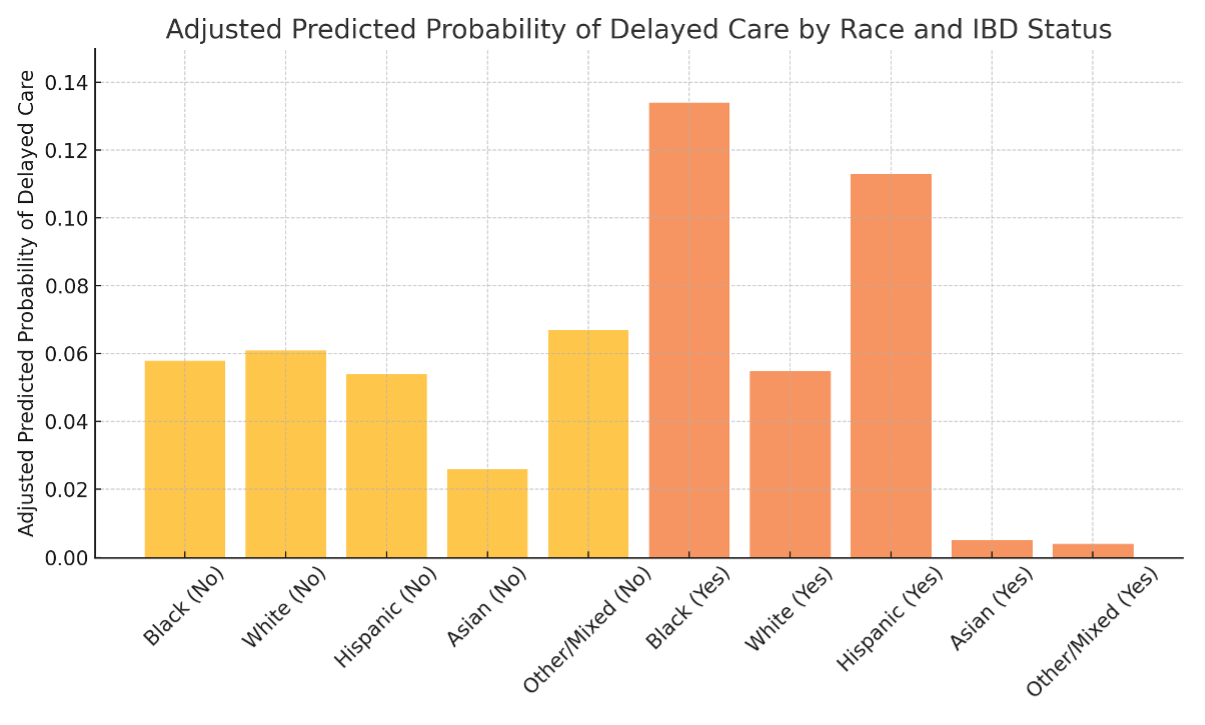Sunday Poster Session
Category: IBD
P1094 - Racial Disparities in Delayed Healthcare Among Individuals With and Without Inflammatory Bowel Disease: A MEPS-Based Analysis
Sunday, October 26, 2025
3:30 PM - 7:00 PM PDT
Location: Exhibit Hall
.jpeg.jpg)
Madhav Changela, MD
One Brooklyn Health-Interfaith Medical Center
Brooklyn, NY
Presenting Author(s)
Madhav Changela, MD1, Janak Bahirwani, MD2, Maulik Kaneriya, MD1, Sanket Patel, DO3, Abdallah Hussein, MD4, Jashanveer S. Singh Johal, MD5, Yecheskel Schneider, MD, MS6
1One Brooklyn Health-Interfaith Medical Center, Brooklyn, NY; 2Kadlec Regional Medical Center, Richland, WA; 3Virtua Health System / Virtua Medical Group, Moorestown, NJ; 4Virtua Health System, Philadelphia, PA; 5Virtua Health System / Virtua Medical Group, Camden, NJ; 6Virtua Health System, Moorestown, NJ
Introduction: Delayed access to healthcare is a significant concern for patients with chronic diseases like inflammatory bowel disease(IBD). However, the intersection between race/ethnicity, IBD status, and care access is poorly understood. This study aimed to assess disparities in delayed healthcare in relation to IBD status and racial background.
Methods: We analyzed data from the 2020 Medical Expenditure Panel Survey (MEPS), including the Full-Year Consolidated Data File and the Medical Conditions File. Adults with IBD were identified based on ICD-10 codes K50 (Crohn’s disease) and K51 (ulcerative colitis). The primary outcome was delayed care, recoded as a binary variable. A survey-weighted logistic regression model was used to estimate the association between race/ethnicity, IBD status, and delayed care. We then adjusted for potential confounders, including age, sex, insurance status, and poverty category.
Results: In the unadjusted model, race, IBD, and their interaction were significantly associated with delayed care (p < 0.001). In the adjusted model, significant predictors of delayed care included age (older age associated with higher odds), female sex, and being uninsured. Race remained a significant predictor, with Black and Other race individuals experiencing higher odds of delayed care than White individuals, and Asian individuals experiencing significantly lower odds. Among individuals with IBD, Black and Hispanic patients had the highest adjusted predicted probabilities of delayed care (13.4% and 11.3%, respectively), while Asian and Other/Mixed race individuals had the lowest (0.5% and 0.4%).
Discussion: Racial disparities in delayed healthcare access persist among individuals with IBD, even after adjusting for sociodemographic confounders. Black and Hispanic patients with IBD remain at highest risk. Targeted efforts to reduce care barriers among vulnerable populations are needed to improve equitable access to healthcare.

Figure: Figure: Adjusted Predicted Probability of Delayed Care by Race and IBD Status

Figure: Table: Adjusted Predicted Probability of Delayed Care by Race and IBD Status
Disclosures:
Madhav Changela indicated no relevant financial relationships.
Janak Bahirwani indicated no relevant financial relationships.
Maulik Kaneriya indicated no relevant financial relationships.
Sanket Patel indicated no relevant financial relationships.
Abdallah Hussein indicated no relevant financial relationships.
Jashanveer Singh Johal indicated no relevant financial relationships.
Yecheskel Schneider indicated no relevant financial relationships.
Madhav Changela, MD1, Janak Bahirwani, MD2, Maulik Kaneriya, MD1, Sanket Patel, DO3, Abdallah Hussein, MD4, Jashanveer S. Singh Johal, MD5, Yecheskel Schneider, MD, MS6. P1094 - Racial Disparities in Delayed Healthcare Among Individuals With and Without Inflammatory Bowel Disease: A MEPS-Based Analysis, ACG 2025 Annual Scientific Meeting Abstracts. Phoenix, AZ: American College of Gastroenterology.
1One Brooklyn Health-Interfaith Medical Center, Brooklyn, NY; 2Kadlec Regional Medical Center, Richland, WA; 3Virtua Health System / Virtua Medical Group, Moorestown, NJ; 4Virtua Health System, Philadelphia, PA; 5Virtua Health System / Virtua Medical Group, Camden, NJ; 6Virtua Health System, Moorestown, NJ
Introduction: Delayed access to healthcare is a significant concern for patients with chronic diseases like inflammatory bowel disease(IBD). However, the intersection between race/ethnicity, IBD status, and care access is poorly understood. This study aimed to assess disparities in delayed healthcare in relation to IBD status and racial background.
Methods: We analyzed data from the 2020 Medical Expenditure Panel Survey (MEPS), including the Full-Year Consolidated Data File and the Medical Conditions File. Adults with IBD were identified based on ICD-10 codes K50 (Crohn’s disease) and K51 (ulcerative colitis). The primary outcome was delayed care, recoded as a binary variable. A survey-weighted logistic regression model was used to estimate the association between race/ethnicity, IBD status, and delayed care. We then adjusted for potential confounders, including age, sex, insurance status, and poverty category.
Results: In the unadjusted model, race, IBD, and their interaction were significantly associated with delayed care (p < 0.001). In the adjusted model, significant predictors of delayed care included age (older age associated with higher odds), female sex, and being uninsured. Race remained a significant predictor, with Black and Other race individuals experiencing higher odds of delayed care than White individuals, and Asian individuals experiencing significantly lower odds. Among individuals with IBD, Black and Hispanic patients had the highest adjusted predicted probabilities of delayed care (13.4% and 11.3%, respectively), while Asian and Other/Mixed race individuals had the lowest (0.5% and 0.4%).
Discussion: Racial disparities in delayed healthcare access persist among individuals with IBD, even after adjusting for sociodemographic confounders. Black and Hispanic patients with IBD remain at highest risk. Targeted efforts to reduce care barriers among vulnerable populations are needed to improve equitable access to healthcare.

Figure: Figure: Adjusted Predicted Probability of Delayed Care by Race and IBD Status

Figure: Table: Adjusted Predicted Probability of Delayed Care by Race and IBD Status
Disclosures:
Madhav Changela indicated no relevant financial relationships.
Janak Bahirwani indicated no relevant financial relationships.
Maulik Kaneriya indicated no relevant financial relationships.
Sanket Patel indicated no relevant financial relationships.
Abdallah Hussein indicated no relevant financial relationships.
Jashanveer Singh Johal indicated no relevant financial relationships.
Yecheskel Schneider indicated no relevant financial relationships.
Madhav Changela, MD1, Janak Bahirwani, MD2, Maulik Kaneriya, MD1, Sanket Patel, DO3, Abdallah Hussein, MD4, Jashanveer S. Singh Johal, MD5, Yecheskel Schneider, MD, MS6. P1094 - Racial Disparities in Delayed Healthcare Among Individuals With and Without Inflammatory Bowel Disease: A MEPS-Based Analysis, ACG 2025 Annual Scientific Meeting Abstracts. Phoenix, AZ: American College of Gastroenterology.
